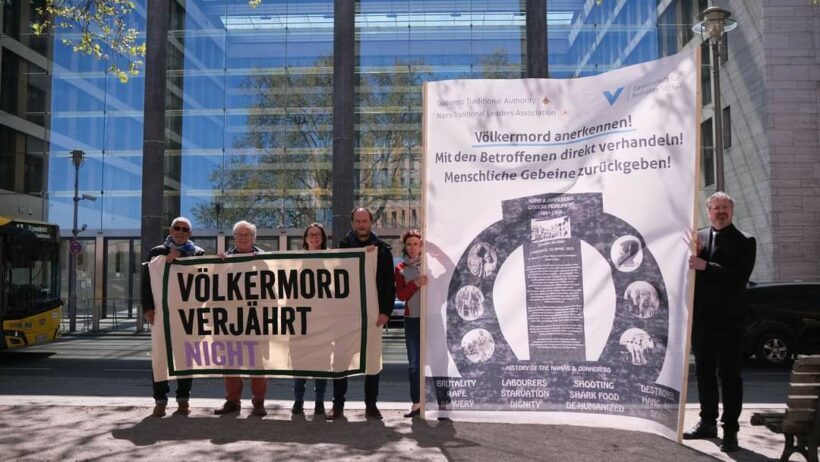On March 8th, the Society for Threatened Peoples (GfbV) held a protest in front of the Federal Foreign Office in Berlin, Germany, drawing attention to the demands of genocide descendants to be included in negotiations between Namibia and Germany.
The protest coincided with the tabling of a report by United Nations Special Rapporteurs, which criticized the joint declaration signed by the two governments.
The protest highlighted the ongoing struggle of the affected communities in Namibia, who continue to demand greater recognition and reparations for their suffering.
The joint declaration proposed in 2021 titled “United in Remembrance of Our Colonial Past, United in Our Will to Reconcile, United
in Our Vision of the Future” included a pledge of €1.1bn (£980m) in development projects over 30 years.
However, descendants of the victims of German colonialism in Namibia rejected the declaration, stating that it lacked details on the number of people killed and land taken during the colonial period.
“After this report, the federal government can no longer pretend that the topic has been resolved. With its answer,
if it actually comes today, the Federal Foreign Office must take international law concerns seriously and resolve them,” said GfbV director Roman Kühn.
The historical context of German colonial rule in Namibia is complex, with the area of Swakopmund being particularly affected by land dispossession from indigenous communities, including the Damaran, Herero, and Nama of Topnaar.
These communities were forced to relocate to coastal areas in search of better living conditions and job opportunities, where they were subjected to cheap labour in farms, railway lines, and extractive mines during the colonial period.
The consequences of these activities continue to affect the affected communities, resulting in psychological and economic deprivation compounded by landlessness.
Moreover, many of the communities affected by genocide have inherited transgenerational and intergenerational trauma from their ancestors who survived the Swakopmund concentration camps.
Despite the joint declaration, the communities affected by the colonial period in Namibia continue to demand greater recognition and reparations for their suffering.










